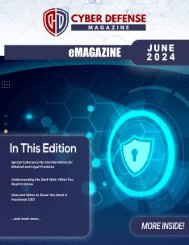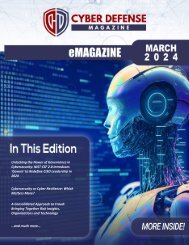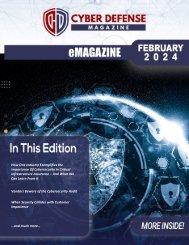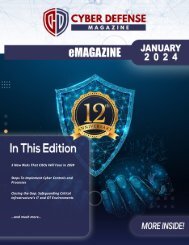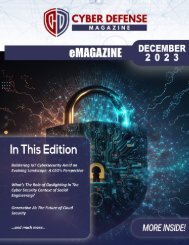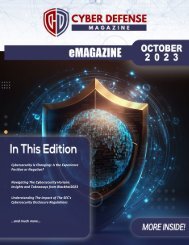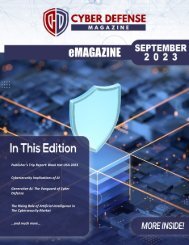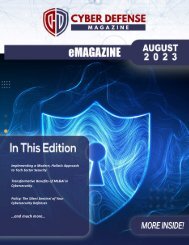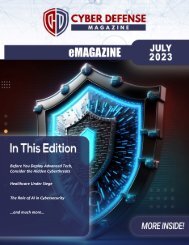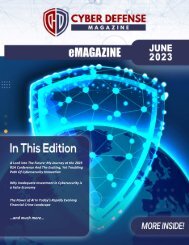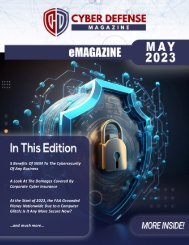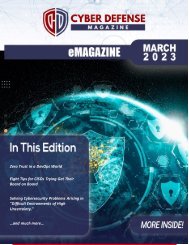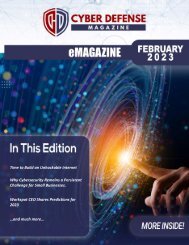Cyber Defense eMagazine December 2019
Cyber Defense eMagazine January Edition for 2020 #CDM #CYBERDEFENSEMAG @CyberDefenseMag by @Miliefsky a world-renowned cyber security expert and the Publisher of Cyber Defense Magazine as part of the Cyber Defense Media Group with Pierluigi Paganini, Yan Ross as International and US Editors-in-Chief and many more hard working amazing contributors!
Cyber Defense eMagazine January Edition for 2020 #CDM #CYBERDEFENSEMAG @CyberDefenseMag by @Miliefsky a world-renowned cyber security expert and the Publisher of Cyber Defense Magazine as part of the Cyber Defense Media Group with Pierluigi Paganini, Yan Ross as International and US Editors-in-Chief and many more hard working amazing contributors!
You also want an ePaper? Increase the reach of your titles
YUMPU automatically turns print PDFs into web optimized ePapers that Google loves.
114<br />
Is It Safe to Connect to Public Wi-Fi?<br />
Free public Wi-Fi is appealing, but it also comes with significant risk and is not safe. As a free service, it<br />
can be used by anyone, including hackers, predators, spies, fraudsters, and all sort of cyber criminals –<br />
so you never know who is sharing the public Wi-Fi connection with you and what their intentions are.<br />
Using public Wi-Fi exposes all your online activities to spying and snooping. There is no data privacy or<br />
security whether it's your personal details like photographs, bank accounts, and social media connections<br />
or business-related information like emails and business files. A hacker armed with a little skill and<br />
knowledge can see what you are doing, which websites you visit and with whom you are connected.<br />
Hacking your passwords is much easier for cyber criminals when you are connected via public Wi-Fi,<br />
putting the security of your accounts at risk – from social media account credentials to email account<br />
logins, bank account information and more. Once your account password is breached, a hacker can lock<br />
you out of your accounts and utilize them for fraudulent or illegal purposes.<br />
Apart from your online activities, public Wi-Fi also makes your offline data and device security vulnerable.<br />
It’s easier for predators to get access to the offline data on your device while you are connected via public<br />
Wi-Fi with malware. This malware can hijack your device and access all the data on it. Viruses can even<br />
destroy the internal system of your device and you can lose all your crucial data.<br />
Hackers and predators can also trace your location when you are connected to public Wi-Fi and gather<br />
information regarding your locations, including information on your family members. This information can,<br />
for those with malicious intentions, be used to cause physical or material harm to you or your loved ones.<br />
Clearly, many potential risks come with using public Wi-Fi – many of which are capable of causing a<br />
prodigious amount of damage. Still, does that mean we should avoid using public Wi-Fi completely?<br />
Staying Safe on Public Wi-Fi<br />
Public Wi-Fi has rapidly become a commodity and sometimes it is hard to resist the temptation to briefly<br />
use it in a pinch. After all, it's free and enormously convenient. There are no guarantees for staying safe<br />
while connected online, but there are a variety of ways to enhance your online security and reduce your<br />
risk of being hacked when using public Wi-Fi.<br />
1. Virtual Private Network (VPN)<br />
A VPN or Virtual Private Network is the safest way of connecting to the internet. It provides access to<br />
servers located around the world and allows you to establish a secure connection from these remote<br />
servers. As a result, you can connect from a server in another country while being physically present in<br />
another location. A VPN allows your computer’s IP address to be hidden so your physical location cannot<br />
be determined, which helps eliminate security concerns related to location tracking and identity theft.<br />
A VPN also provides an encrypted tunnel for all your online activities. All the data sent and received<br />
through the VPN is encoded, so nobody can see what you are doing online. This removes opportunities




